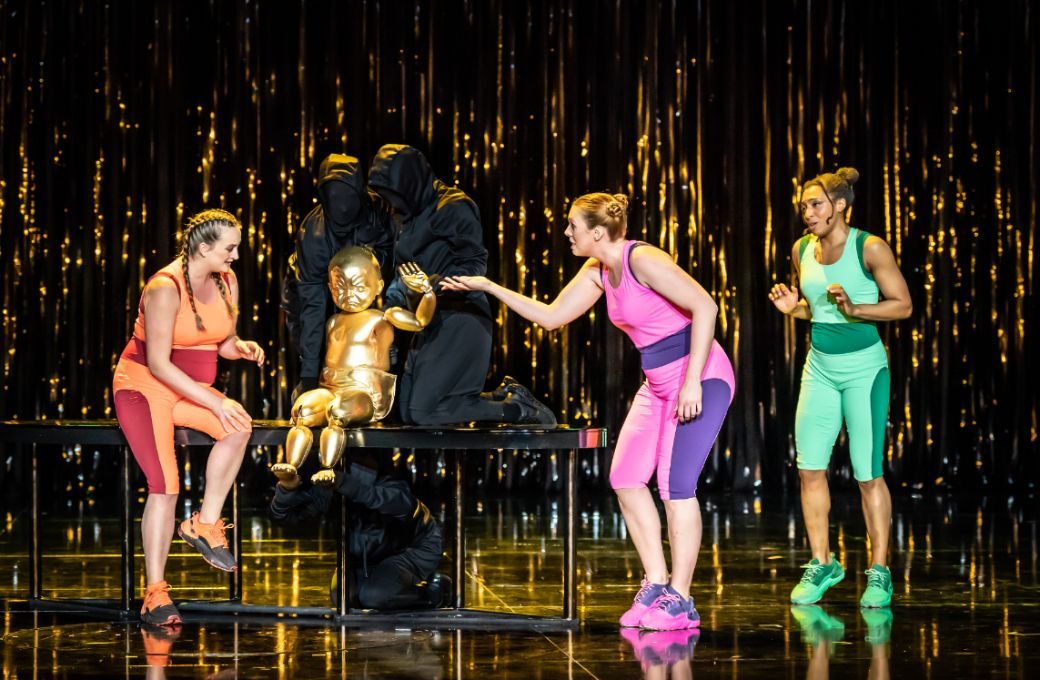“Events, dear boy, events.” Harold Macmillan’s view of the most difficult thing in leadership would have resonated with Wotan in The Rhinegold: more than anywhere else in Wagner’s output, events come thick and fast, demanding that the audience understands them and, hopefully, the implications for what is to follow. Richard Jones’ new production for English National Opera does an exceptional job of putting across the wealth of narrative. It starts with Alberich’s transformation from hapless incel to Bond-villain monster, portrayed with painful credibility by Leigh Melrose, carried by dancers incarnating the waters of the Rhine and mercilessly prick-teased by svelte Rhine-daughters in fluorescent exercise gear. How times have changed from Jones’ 1990s Covent Garden Ring, when he was derided for giving us “Rhinemaidens in fat suits”.

Musically, also, Wagner is preparing the audience for the story to come by introducing the themes that will recur throughout the cycle. Martyn Brabbins and the ENO Orchestra landed the key musical moments effectively: the horn-laden E flat major of the overture, the brassy sonority of the ascending motif that takes us to the heights of Valhalla, the descending notes of the Ring and its curse, the hammering of the gold-mining Nibelungs. This might not be the most radiant orchestral performance of a Rhinegold that I’ve ever heard, but it was consistently lucid and well balanced, allowing individual instrumental lines to shine through. Brabbins chose his tempi judiciously, never too frantic and hardly ever dragging.
Jones conjured acting performances from the whole cast that illuminated events and motivations. John Relyea’s Wotan was a far more nuanced character than we often see, distanced and dreamy as often as he was bullying or devious. Madeleine Shaw’s Fricka was more of a natural gold digger than any pick-wielding Nibelung. Frederick Ballentine oozed wide-boy charm as Loge. Jones also throws in some detail for Wagner nerds. Before the prelude, this Rhinegold opens with the true beginning of the cycle as related by the First Norn in Götterdämmerung: in a kind of Nordic take on original sin, Wotan crafts his spear from a bough he has ripped from the world-ash-tree, an act that will eventually lead to the end of the living world. If you’ve ever wondered how Wotan, fading from being deprived of Freia’s golden apples, musters the strength to descend to Nibelheim to defeat Alberich, Jones has an answer: Loge has squirrelled away one of the apples, which he produces from his pocket at the critical moment. There’s a tender moment when Fasolt offers his handkerchief to the tearful Freia, and at the point of Freia’s return and Fasolt’s murder, we are left in no doubt that – being the goddess of love – she has recognised true love when she sees it. Admittedly, there’s no sense of that in the libretto, but the idea strikes a chord.
Some of the staging tricks are superbly executed: the Nibelungs’ factory, the gold bars piled on pallets into the giants’ truck, the falling glitter that represents the rainbow bridge, Valhalla itself turning out to be not a place of glory but a bunker in which the gods incarcerate themselves. The depiction of Alberich being both invisible and everywhere drew gasps and is so clever that I won’t spoil it. Other things fall flat or seem designed to satirise the production itself: Alberich’s transformation into dragon and toad is cartoonish and silly, at odds with the music; we know that Donner is a hammer thrower, but making him do it as if he was in an athletics stadium is toe-curling. And little will reconcile me to Jones’ favoured costume aesthetic, familiar from previous productions, with Stewart Laing’s designs mostly straying towards the far side of kitsch.
With no fewer than 14 singing roles, all of which are significant at some point, The Rhinegold is a true ensemble piece. In this production, every role was sung with musicality and purpose and there was much to enjoy from everyone, making it impossible to name-check everyone who deserves it. Some highlights for me were the nobility in Relyea’s announcement of the completion of Valhalla (although his closing “Abendlich strahlt der Sonne Auge” was strangely muted), Madeleine Shaw golden-voiced and lyrical as Fricka, Blake Denson defying the naffness of Donner’s costume to deliver a blistering summons to the clouds, the resonant and perfectly elocuted bass interchanges between James Creswell and Simon Bailey as the two giants, and the easy glitter of Ballentine’s tenor just about whenever he sang a note.
I may not like all the visuals, and this Rhinegold may not be filled with individual wow moments. But it’s very good vocally, highly competent musically and it delivers comprehensively on the storytelling. That makes it thoroughly recommendable for Ring novices and devotees alike.


